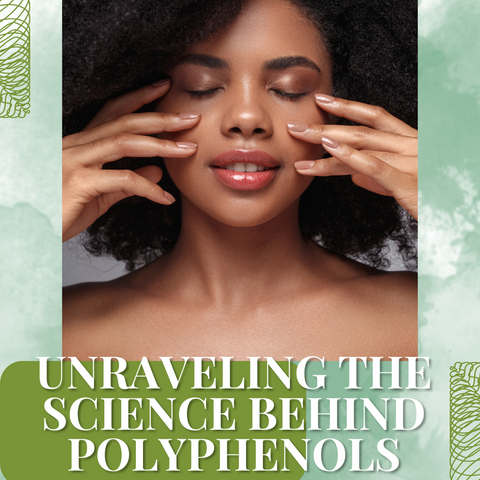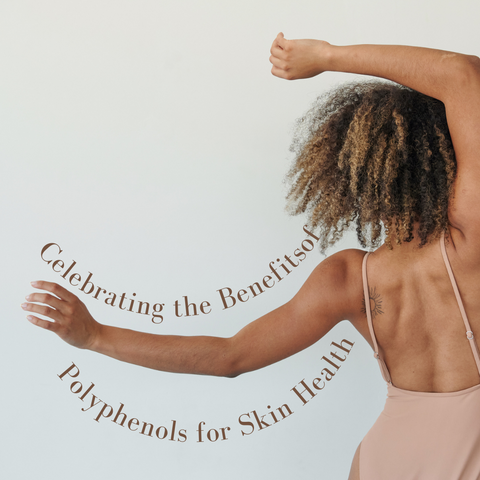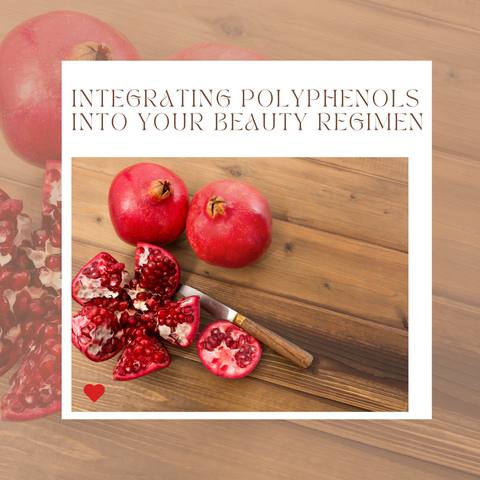Polyphenols are a varied set of chemicals found in plants that are well-known for their antioxidant capabilities. Polyphenols have various possible benefits when used in skincare. This blog will walk you through the realm of polyphenols in skincare.
Unraveling the Science Behind Polyphenols

Polyphenols are naturally occurring chemicals found in plants, fruits, vegetables, and other food sources. Their molecular structure, which contains numerous phenolic rings, distinguishes them. Polyphenol science entails investigating its structure, functions, and therapeutic effects, particularly in skincare and overall health. While polyphenols have promise benefits, the effectiveness of skincare products is dependent on a variety of parameters such as formulation, concentration, stability, and individual skin sensitivities. Skincare professionals or dermatologists can provide specialised advice on how to use polyphenols efficiently for certain skin issues.
What are Polyphenols?
Polyphenols are a varied collection of naturally occurring plant chemicals. They are made up of a variety of chemical compounds that are distinguished by the presence of several phenolic rings. These chemicals can be found in abundance in a variety of fruits, vegetables, cereals, herbs, spices, tea, coffee, wine, and other plant-based meals.
Origin and Natural Sources of Polyphenols
Polyphenols are plentiful in a variety of plant-based foods, and their antioxidant and anti-inflammatory qualities provide a wide range of health advantages. Fruits, vegetables, legumes, nuts, herbs, spices, drinks, cereals, and other sources are examples of natural sources and their origins. Consuming a variety of these plant-based meals can provide a broad range of polyphenols, potentially contributing to health benefits. However, the amount of polyphenols in foods varies depending on factors such as ripeness, processing, and cooking methods. A balanced diet rich in fruits, vegetables, whole grains, nuts, and beverages like green tea will provide you with a wide range of polyphenols.
Celebrating the Benefits of Polyphenols for Skin Health

Polyphenols have several skin health benefits because of their antioxidant, anti-inflammatory, and protective qualities. Understanding how polyphenols affect skin and contribute to its overall health and attractiveness is necessary for celebrating these benefits:
-
Antioxidant Protection: Polyphenols act as free radical scavengers, reducing oxidative stress caused by environmental factors such as UV radiation and pollution. This helps to protect skin cells from damage, reducing premature ageing signs like wrinkles and fine lines. Polyphenols contribute to the skin's natural defence mechanisms by neutralising free radicals, assisting in protection against external stressors and environmental damage.
-
Anti-Inflammatory Effects: Some polyphenols have anti-inflammatory properties, which help to calm irritated skin and reduce redness or inflammation caused by a variety of factors, including environmental aggressors and skin conditions. The anti-inflammatory properties of certain polyphenols may aid in the healing process of irritated or damaged skin, contributing to a healthier complexion.
-
Collagen Synthesis and Anti-Aging: Polyphenols can increase collagen synthesis, which improves skin suppleness and firmness. Increased collagen production aids in the reduction of wrinkles and promotes a more youthful complexion. Polyphenols contribute to anti-aging effects by boosting collagen formation and protecting against oxidative stress, potentially lowering the indications of ageing and retaining a more youthful appearance.
-
Skin Brightening and Even Tone: Certain polyphenols have been linked to melanin synthesis inhibition, potentially lowering the appearance of dark patches, hyperpigmentation, and encouraging a more even skin tone.
-
Moisture Retention and Barrier Support: Some polyphenols help the skin barrier by retaining moisture and reducing dehydration. This helps to make the skin softer, smoother, and more supple.
-
Utilizing Polyphenols in Skincare: When used topically, skincare products containing polyphenol-rich ingredients such as green tea extract, grape seed extract, or resveratrol can provide antioxidant and anti-aging benefits. Consuming a diet high in polyphenol-containing foods can provide internal benefits for skin health. Fruits, vegetables, whole grains, and teas are all excellent sources of antioxidants.
Antioxidant Powerhouse: Battling Free Radicals
Polyphenols are an antioxidant powerhouse, combating free radicals and oxidative stress, both of which are harmful to skin health. Here's how they outperform free radicals:
-
Neutralising Free Radicals: Polyphenols have powerful antioxidant properties that allow them to neutralise free radicals and reactive oxygen species (ROS), preventing cellular damage caused by oxidative stress. Their structure allows them to donate electrons to unstable free radicals, stabilising them and reducing their harmful effects on skin cells.
-
Environmental Protection: Polyphenols can help prevent UV-induced damage by lowering photoaging effects and mitigating the impact of UV-generated free radicals. Pollutants in the environment generate free radicals, which can cause skin damage. Polyphenols reduce these effects by protecting the skin from pollution-related damage.
-
Anti-Aging Effects: Polyphenols help to preserve collagen and elastin fibres, which are crucial for maintaining skin elasticity and firmness and decreasing the appearance of wrinkles and fine lines by neutralising free radicals. Reduced oxidative stress aids in the prevention of environmental-caused premature ageing indicators such as dullness, uneven skin tone, and loss of radiance.
-
Skin Repair and Regeneration: Polyphenols aid in skin rejuvenation and the maintenance of a healthy skin barrier by contributing to cellular repair mechanisms. They strengthen the skin's natural defence mechanisms, allowing it to better withstand damage caused by free radicals and other stressors.
-
Incorporating Polyphenols for Skin Protection: Using skincare products containing polyphenol-rich extracts like green tea, grape seed, or pomegranate can help to protect the skin by harnessing their antioxidant power. A diet rich in polyphenol-containing foods, such as fruits, vegetables, nuts, and teas, supplements skin health from within, aiding in the fight against free radical damage.
Hydration and Skin Restoration
Polyphenols, while well known for their antioxidant effects, also aid in skin hydration and healing. Here's how they contribute to these aspects:
-
Hydration Support: Polyphenols help to reinforce the skin's natural barrier function, which is essential for moisture retention. They help prevent water loss by strengthening the barrier, and keeping the skin hydrated and plump. Some polyphenols have humectant properties, which attract moisture from the environment to the skin and thus improve hydration levels.
-
Skin Restoration: Polyphenols have anti-inflammatory properties, which can help soothe irritated skin. This promotes healthier-looking skin by helping to balance the skin and reducing redness or discomfort brought on by a variety of circumstances. Some polyphenols have the ability to promote cell regeneration, which helps to repair damaged skin cells. This procedure aids in the restoration of a complexion that is more vibrant and youthful.
-
Use of Polyphenols for Hydration and Restoration: Including skincare products containing polyphenol-rich extracts, such as aloe vera, green tea, or chamomile, in your routine can provide soothing and hydrating effects, assisting in skin restoration. Some polyphenol-infused moisturisers or serums target hydration specifically, utilising the humectant properties of specific polyphenols to attract and retain moisture in the skin.
-
Additional Tips for Skin Hydration: Using a humidifier in an indoor environment helps maintain moisture levels, preventing skin dryness, particularly during dry or winter months. Drink enough water throughout the day to maintain overall hydration, which improves skin moisture levels.
Anti-Aging and Skin Elasticity Enhancement
Polyphenols have an important role in anti-aging treatment by improving skin suppleness. Collagen support, anti-aging effects, antioxidant properties, anti-aging benefits, enhancing skin elasticity, using polyphenols for anti-aging and elasticity, and healthy habits for skin elasticity are some of the ways they can help with this. Incorporating polyphenol-rich skincare products into your routine, combined with sun protection and a healthy diet, can help you maintain skin firmness, elasticity, and a youthful appearance.
Protection Against Environmental Stressors
Polyphenols act as a protective layer against environmental stresses, providing significant skin health advantages. They protect the skin from various environmental aggressors in the following ways:
-
Defense Against UV Damage: Polyphenols have antioxidant characteristics that aid in the neutralisation of free radicals produced by UV light. This decreases oxidative stress and thus the damage caused by sun exposure. By combating UV-induced damage, polyphenols contribute to reducing signs of premature aging, such as wrinkles, fine lines, and hyperpigmentation caused by chronic sun exposure.
-
Protection from Pollution: Pollutants in the environment produce free radicals, which injure skin cells. The antioxidant properties of polyphenols combat these free radicals, protecting the skin from environmental damage. Polyphenols help the skin's natural barrier function by reinforcing it against pollutants and impurities, minimising the skin's unfavourable impact.
-
Environmental Stress Protection: Some polyphenols have anti-inflammatory properties that can help alleviate skin irritation caused by environmental stresses such as pollution or severe weather. Polyphenols aid in cellular repair mechanisms, assisting the skin in recovering from environmental stressor damage.
-
Polyphenols for Environmental Protection: When applied topically, skincare products containing polyphenol-rich extracts such as green tea, grape seed extract, or pomegranate can provide protection against environmental stresses. Polyphenol-infused serums, lotions, and face oils help strengthen the skin's defences against environmental aggressors while also offering additional nourishment.
-
Environmentally Friendly Habits: Aside from polyphenols, broad-spectrum sunscreen is essential for protecting the skin from harmful UV rays. Cleaning the skin on a regular basis aids in the removal of pollutants and impurities, bolstering the skin's defence against environmental stressors.
Polyphenols provide an important defence mechanism against environmental stresses such as UV radiation and pollution due to their antioxidant and protective characteristics. Incorporating polyphenol-rich skincare products and practising healthy skincare routines can help protect the skin from external aggressors, preserve its health, and keep a young appearance.
Integrating Polyphenols into Your Beauty Regimen

Including polyphenols in your beauty routine can provide numerous benefits for skin health and vitality. Here's a step-by-step guide to effectively incorporating polyphenols:
-
Cleansing: Choose cleansers that contain polyphenol-rich extracts like green tea or grape seed extract to remove impurities while also providing antioxidant protection.
-
Toning: Toners infused with polyphenols can help balance skin pH and prepare it for better absorption of subsequent skincare products.
-
Serums: Choose serums that contain polyphenol-rich extracts like green tea, resveratrol, or pomegranate. These concentrated formulas penetrate the skin with antioxidants and other active ingredients.
-
Moisturisers: Choose moisturisers that contain polyphenols to hydrate the skin while also providing antioxidant protection. Look for creams and lotions that contain botanical extracts such as chamomile or licorice root.
-
Eye Creams: Eye creams containing polyphenols, such as caffeine or grape seed extract, can eye cream help reduce puffiness, dark circles, and protect the delicate skin around the eyes.
-
Masks and Treatments: Incorporate polyphenol-rich masks or treatments into your weekly routine for a weekly boost. These can give intensive antioxidant care as well as target specific skin issues.
-
Sunscreen: Even if your skincare products contain polyphenols, always apply a broad-spectrum sunscreen with an SPF of 30 or higher. Sunscreen is required to protect the skin from UV rays.
-
Dietary Integration: Aside from topical treatment, add polyphenol-rich foods like berries, green tea, dark chocolate, almonds, and colorful fruits and vegetables to your diet. This supplemented skincare by offering antioxidant support on the inside.
Integration Suggestions:
-
Patch Test: Before attempting new products, perform a patch test to ensure your skin does not react negatively.
-
Consistency: Using polyphenol-rich products consistently is essential for reaping their benefits over time.
-
Consultation: If you have specific skin concerns or conditions, consult with a dermatologist or skincare professional for tailored recommendations.
-
Product Rotation: Consider alternating different polyphenol-rich products to address different skin needs and avoid overloading the skin with one ingredient.
Including polyphenols in your beauty regimen entails choosing skincare products that contain these beneficial compounds, maintaining consistency, and supplementing them with a healthy lifestyle and diet. This comprehensive approach can improve the health of your skin, combat environmental damage, and contribute to a radiant complexion.
Picking the Right Polyphenol-Infused Products
Choosing the best polyphenol-infused skincare products requires taking into account a number of things in order to suit your individual skin concerns and preferences. Here's a guide to help you choose the best products:
-
Identify Your Skin Concerns: If you are looking to reduce the signs of ageing, look for products that contain polyphenols known for their collagen-boosting properties, such as green tea, resveratrol, or grape seed extract. To keep skin moisturised, look for polyphenol-rich products with humectant properties, such as aloe vera or honey. Antioxidants such as green tea, pomegranate, and vitamin C provide protection against environmental stressors and free radicals.
-
Read Ingredient Lists: Search for the particular polyphenol-rich ingredients (resveratrol, green tea extract, grape seed extract, etc.) that are listed higher in the ingredient list and have higher concentrations of these compounds. Look for extra healthy components that work in tandem with polyphenols, like vitamin E for increased antioxidant effects or hyaluronic acid for hydration.
-
Consider Skin Type: Products with mild formulations and fewer possible irritants are best for sensitive skin. Look for polyphenols that are calming, such as chamomile or licorice root extract. Choose moisturising products with polyphenol-infused ingredients, such as shea butter or argan oil, to add extra moisture. Lightweight formulations with polyphenol-containing gels or serums that balance oil production are beneficial for combination or oily skin types when combined with niacinamide.
-
Product Types: These concentrated formulations deliver high doses of polyphenols for specific skincare issues. Daily moisturisers containing polyphenols provide hydration as well as antioxidant protection. Using polyphenol-rich masks on a weekly basis provides an extra antioxidant boost. Products containing polyphenols that are specifically formulated for the delicate eye area can help reduce puffiness and dark circles.
-
Stability and Packaging: Make sure the product is properly packaged to ensure stability and prevent polyphenol degradation. To protect the efficacy of these antioxidants, use opaque or airtight containers.
-
Patch Test: Before introducing a new product into your routine, perform a patch test to rule out any allergic reactions or sensitivities, especially if you have sensitive skin.
-
Reviews and Recommendations: To acquire insights into the efficacy of the product for different skin types and issues, read reviews or seek suggestions from dermatologists, skincare professionals, or reputable sources.
Understanding your skin's demands, reviewing ingredient lists, considering formulations suitable for your skin type, and assuring product stability and efficacy are all part of choosing the correct polyphenol-infused products. With these ideas, you may select products for your skincare routine that successfully harness the benefits of polyphenols.
Dos and Don'ts with Polyphenol Skincare
Certain dos and don'ts when introducing polyphenol skincare into your routine will optimise their efficiency and ensure your skin benefits while avoiding potential pitfalls:
Dos:
-
Patch Test: Always perform a patch test before using a new polyphenol-infused product to rule out any allergic reactions or skin sensitivities.
-
Read Product Labels: Look for specific polyphenol-rich ingredients and their concentrations on product labels to ensure you are getting the desired benefits.
-
Consider Stability: Choose products with stable formulations and proper packaging to preserve the potency of polyphenols, which can degrade when exposed to light, air, or heat.
-
Follow Directions: Use polyphenol-rich products as directed to maximise efficacy while avoiding skin irritation or overuse.
-
Be Consistent: Using polyphenol-infused products on a regular and consistent basis can yield better results over time. Incorporate them into your daily skincare routine for the best results.
-
Complement with Sunscreen: While polyphenols provide antioxidant protection, they are not a replacement for sunscreen. To protect your skin from UV damage, always use a broad-spectrum sunscreen.
Don'ts:
-
Overuse of Products: Using too many polyphenol-rich products at once may overburden the skin or cause irritation. Begin with one or two and gradually add more if necessary.
-
Assume a one-size-fits-all approach: Not all polyphenols are suitable for all skin types. What works for one person may not work for the next. Pay attention to how your skin reacts and make adjustments as needed.
-
Neglect Patch Testing: If you have sensitive or reactive skin, skipping a patch test before using a new polyphenol-rich product may result in adverse reactions.
-
Expect Immediate Results: Skincare results take time to appear. When using polyphenol-infused products, patience is essential; consistent use over several weeks may be required to see noticeable improvements.
-
Over-Reliance on Skincare: While skincare is important, lifestyle factors such as diet, hydration, sleep, and stress management also have an impact on overall skin health. Aim for a comprehensive approach.
-
Ignore Professional Advice: If you have specific skin concerns or conditions, consult a dermatologist or skincare professional before introducing new products into your routine.
When introducing polyphenol skincare into your routine, following these dos and don'ts can help you get the benefits of these antioxidants while minimising the risk of unwanted reactions or abuse. Being thoughtful and consistent in your skincare routine is essential for healthier, more vibrant skin.
Tailoring Your Skincare Routine for Optimal Benefits
Personalised skincare routines are required to maximise the benefits of polyphenol-rich products. Identifying your skin concerns, morning skincare regimen, evening skincare routine, weekly treatments, lifestyle considerations, and adjusting based on skin response are some tips for customising your regimen to maximise these benefits. You can maximise the benefits of polyphenols for healthier, more vibrant skin by tailoring your routine and lifestyle.
The Lasting Impression: Polyphenols and Their Undeniable Efficacy

Polyphenols stand out in skincare for their undeniable efficacy in addressing a wide range of skin conditions, including antioxidant protection and anti-aging effects, as well as hydration, skin barrier support, and more. Because of their adaptability and high antioxidant qualities, they are a great asset in obtaining healthier, more resilient, and more beautiful skin. Integrating polyphenol-rich skincare products into your skincare routine, together with a healthy lifestyle, provides a comprehensive approach to achieving optimal skin health and attractiveness.
















